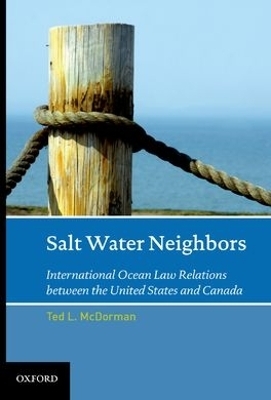
Salt Water Neighbors
Oxford University Press Inc (Verlag)
978-0-19-538360-7 (ISBN)
Against this background, Salt Water Neighbors examines both the international ocean law disagreements that exist between the United States and Canada respecting maritime boundaries, fisheries and navigation rights (e.g., the Northwest Passage) and the numerous cooperative bilateral arrangements that have prevented these disputes from being significant causes of friction between the neighbors. There has not been a comprehensive book-length study of United States-Canada international ocean relations since the early 1970s. Much has changed in the last 30 years. Most importantly, the law and the nature of the disputes between the two States have changed as a result of the adoption of 200 nautical mile zones in the late 1970s.
Ted McDorman is a Professor of Law at the University of Victoria, British Columbia. He has published over 100 articles regarding ocean law and policy issues and since 2000 has been the Editor-in-Chief of Ocean Development and International Law, North America's premier ocean law journal.
Preface ; List of Treaties ; List of International Cases ; Chapter One - INTRODUCTION ; Part A ; 1.0 ; Introduction ; 2.0 ; Context of the Canada-U.S. Ocean Relationship ; Perception/Interests ; Pragmatism (Agreeing-to-Disagree) ; Avoiding Resolution ; The Other Neighbours ; Broader Bilateral Relationship ; History ; 3.0 LOS Convention, International Law and National Offshore Zones ; International Law: Treaties, Custom and Adjudication ; Offshore Zones ; Part B ; 4.0 A Few Words on Other Treaties and Ocean Governance ; Ocean Fora ; Deep Seabed Mining ; Ship Safety and Vessel-Source Pollution ; Land-Based Sources of Marine Pollution ; Fisheries ; Whaling ; Biodiversity ; Port Security and Terrorism at Sea ; ANNEX ; Chapter Two - 1970: THE LANDMARK YEAR ; 1.0 Introduction ; 2.0 1970: The Year of Transition of International Ocean Law ; 3.0 ; Canadian Actions in 1970 ; Continental Shelf ; Territorial Sea and Fishing Zones ; Arctic Waters Pollution Prevention Act ; Functionalism and Unilateralism ; 4.0The Canada-U.S. Ocean Relationship Emerging from 1970 ; Differing Ocean Interests and Approaches ; Agreeing-to-Disagree ; 5.0Continuing Echo of 1970 ; Chapter Three - UNCLOS III AND THE LOS CONVENTION ; 1.0 Introduction ; 2.0 At UNCLOS III ; Offshore Resources ; Navigation and Vessel-Source Pollution Issues ; Common Heritage of Mankind and Deep Seabed Mining ; 3.0 The LOS Convention ; Adoption of the Convention and the 1980s ; Party Status ; 4.0 Conclusion ; Chapter Four - CANADA - UNITED STATES MARITIME BOUNDARIES ; 1.0 ; Introduction ; Part A ; 2.0 Agreed Canada - U.S. Maritime Boundaries ; Juan de Fuca Strait ; Passamaquoddy Bay ; Portland Canal - The 1903 Alaska Boundary Arbitration ; 3.0 The 1984 Gulf of Maine Case ; Getting to Court ; Proposed Boundary Lines ; Judgment of the Court ; Aftermath ; Part B ; An Overview of Maritime Boundary Delimitation Law ; State Practice ; The Law - The Two-Step Process ; 5.0 Unresolved Maritime Boundaries ; British Columbia/Alaska Maritime Boundaries ; British Columbia/Washington Maritime Boundary ; Seaward of the Gulf of Maine ; Beaufort Sea ; Machias Seal Island and North Rock ; Part C ; 6.0 Conclusion ; ANNEX: Questions and Detail Respecting the Application of the Two-Step Process ; I. Provisional Equidistance ; II. Special/Relevant Circumstances ; Chapter Five - STATUS OF WATERS AND NAVIGATION RIGHTS ; 1.0 ; Introduction ; Part A ; 2.0 International Law Respecting Navigational Rights in National Waters ; Historic Internal Waters ; International Straits ; Part B ; 3.0 Northwest Passage ; Ice and Climate Change ; International Legal Positions ; Cooperation Respecting the Northwest Passage ; Future of the Dispute ; 4.0 Head Harbour Passage ; Proposed Tanker Traffic ; International Legal Positions ; Cooperation and the Future of the Dispute ; 5.0 Dixon Entrance, Hecate Strait and Queen Charlotte Sound ; 6.0 Georgia Strait, Johnstone Strait, Queen Charlotte Strait and the Inside Passage ; 7.0 Juan de Fuca Strait ; 8.0 Conclusion ; Chapter Six - FISHERIES ; 1.0 Introduction ; 2.0 Pacific Salmon ; Introduction ; The 1985 Canada - U.S. Pacific Salmon Treaty ; The 2002 Yukon River Agreement ; North Pacific Anadromous Stocks Convention ; 3.0 Other Fisheries ; Pacific Halibut ; Albacore Tuna ; Hake/Whiting ; 4.0 Conclusion ; Chapter Seven - REVIEWING THE PAST, LOOKING TO THE FUTURE ; Bibliography of Government Documents and Other Sources (Selected) ; Bibliography of Academic Literature ; Index
| Erscheint lt. Verlag | 26.2.2009 |
|---|---|
| Zusatzinfo | maps |
| Verlagsort | New York |
| Sprache | englisch |
| Maße | 236 x 160 mm |
| Gewicht | 720 g |
| Themenwelt | Recht / Steuern ► EU / Internationales Recht |
| Recht / Steuern ► Privatrecht / Bürgerliches Recht ► Internationales Privatrecht | |
| ISBN-10 | 0-19-538360-5 / 0195383605 |
| ISBN-13 | 978-0-19-538360-7 / 9780195383607 |
| Zustand | Neuware |
| Haben Sie eine Frage zum Produkt? |
aus dem Bereich


